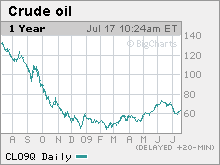Oil settles above $63
Strong U.S. housing data support signs of a rebound in a key sector of the economy.
NEW YORK (Reuters) -- Oil closed above $63 a barrel Friday, posting its first weekly gain in a month, after U.S. housing data sparked optimism that a battered sector of the economy may be primed for recovery.
Oil rose for a fifth day, partially reversing its 10% plunge last week.
A U.S. government report Friday showed construction of new homes and building permits in the United States rose more than expected in June, signaling a potential economic recovery.
The housing data Friday added to better-than-expected U.S. corporate earnings and robust Chinese economic growth figures earlier this week.
Renewed, violent protests over contested presidential elections in crude supplier Iran on Friday, and a tropical wave in the Central Atlantic that posed a small threat of becoming a hurricane, also spurred oil buying ahead of the weekend.
"Oil is rebounding because there's a sense we have probably overplayed pessimism about the economy lately, and prices had fallen too far," said Phil Flynn, an analyst at Foggiest Research in Chicago.
"Increased tension in Iran and a tropical wave (in the Atlantic) are also considerations. People don't want to be caught short over the weekend."
U.S. crude oil for August settled up $1.54 to $63.56 a barrel.
Oil rose in spite of a 0.3% strengthening of the U.S. dollar against a basket of foreign currencies. A strengthening dollar often weakens oil prices, which had fallen in earlier trade, since it makes crude more expensive in most regions. The dollar pared some of its earlier gains, after rising 0.4% earlier.
Global stocks rose on Friday, by 0.7%, and touched a one-month high in earlier trade. Bank of America (BAC, Fortune 500) posted lower earnings but Citibank (C, Fortune 500) rose after a one-off gain to return a profit, following strong profits from banking peers this week, which pushed equities higher.
In China, refiners in the world's No. 2 energy consumer boosted production by 6% in June to a record high after a rise in domestic motor fuel prices aided margins, although higher inventories and rising exports suggested domestic demand was lagging.
Data earlier this week showed Chinese growth sped up to hit 7.9% in the second-quarter, fueled by state spending and bank lending.
Oil prices are down $7 a barrel since early July, partly reversing last quarter's 40% surge on concerns over energy demand. In the United States, distillate inventories hit a fresh 25-year high last week, while refiners have been running at lower-than-normal rates for the summer season. ![]()



